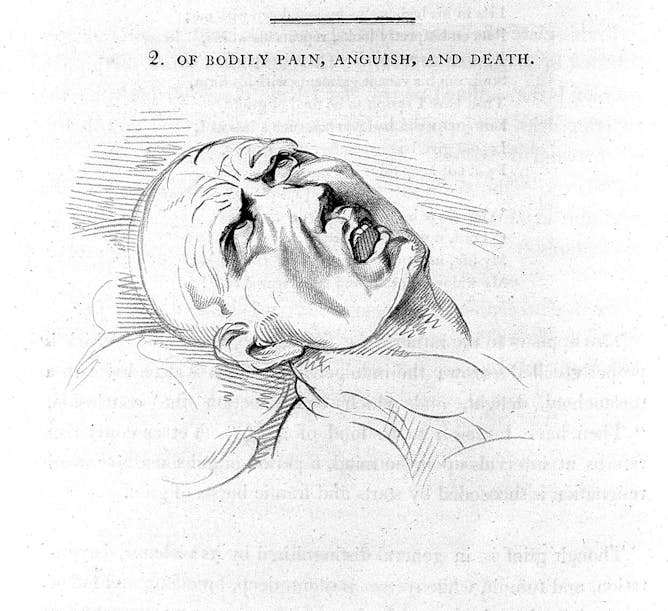Editor's note
|
|
America’s deadly opioid crisis has sparked difficult conversations about pain. Why do Americans take more drugs for pain than people in other countries? Are there better ways to treat pain? And why is it so hard to find relief? Today, Joseph Gabriel from Florida State University kicks off our new series on pain. A historian, Gabriel describes the 19th-century roots of drug addiction and racial inequality in the U.S., from Civil War soldiers on morphine to narcotic prescriptions today.
Six out of 10 middle and high school students cite alt-right websites when they write research papers for school, according to a preliminary survey conducted by Jennifer Rich, an assistant professor of education. Rich argues educators should help students distinguish fact from the fiction that she says the alt-right pushes to advance its white supremacist agenda.
Many of us use scheduling apps to divvy up our day into blocks of appointments, meetings and calls. The Ohio State’s Selin Malkoc wanted to know how setting a schedule influences what we accomplish – or think we can accomplish – during our unstructured time. She discusses the surprising findings of her new study, which show how scheduling can backfire.
|
Aviva Rutkin
Big Data + Applied Mathematics Editor
|

|
|
Top stories
|

Pain of the sick: ‘Anatomy of Expression,’ by Sir Charles Bell, 1806.
Wellcome Collection
Joseph Gabriel, Florida State University
In today's opioid crisis, why are some people with addictions treated with empathy and others with disdain? The answer to that question has roots in the 19th century.
|

Middle and high school students turn to alt-right websites for their research papers.
Steve Heap/www.shutterstock.com
Jennifer Rich, Rowan University
A researcher discovered that many US students cite alt-right websites in their research papers. Should teachers discuss the websites to help students tell fact from fiction?
|

Ticking away the moments that make up a dull day …
NAN728/Shutterstock.com
Selin Malkoc, The Ohio State University
You might think you've made your day more efficient – but it can actually affect what you accomplish during your unstructured time.
|
Environment + Energy
|
-
Robert Brulle, Drexel University
A scholar of climate misinformation campaigns explains how, in part, the large gap in public opinion on global warming emerged since a scientist's landmark clarion call for action.
-
Jonathan Buonocore, Harvard University
Generating less electricity with fossil fuels could help save lives.
|
|
|
|
Politics + Society
|
-
Taasogle Daryl Rowe, Ph.D., Pepperdine University; Kamilah Marie Woodson, Ph.D., Howard University
The National Memorial for Peace and Justice helps demonstrate that the lynching of black people was not the fault of victims. But telling this history risks re-traumatizing the black community.
-
Jonathan Spiegler, Michigan State University; Jacob Smith, University of North Carolina – Chapel Hill
After mass killings, politicians feel compelled to offer solutions to gun violence. One of the most common answers is better access to mental health care, but research has found that's not effective.
-
Fabio Andres Diaz, International Institute of Social Studies
In the most peaceful election in their modern history, Colombians have elected as their next president a conservative who will renegotiate the country's fragile 2016 accord with the FARC guerrillas.
-
Benjamin Waddell, Centro de Investigación y Docencia Económicas
History shows that Latin American presidents usually don't last long after they use violence to repress mass protests. Is Nicaragua's Daniel Ortega the next to fall?
|
|
|
|
|
|
From our international editions
|
-
Amélie Cabirol, University of Trento; Andrew Barron, Macquarie University
The work honey bees do is critical for our ecosystems, but it comes at a high personal cost.
-
Peter Barlow, Edinburgh Napier University
Getting rid of this scourge is nothing to be sneezed at.
-
Michael von Massow, University of Guelph; Alfons Weersink, University of Guelph
The use of antibiotics in raising livestock is complex. We could be moving towards a less-than-ideal result due to poor understanding, over-simplistic messaging and a rush for competitive advantage.
|
|
Today’s chart
|
-

 |
Margot Kushel
University of California, San Francisco
|
| |
| |
| |
|
|